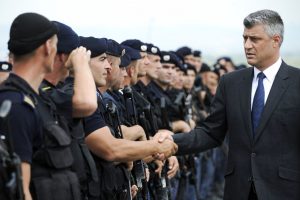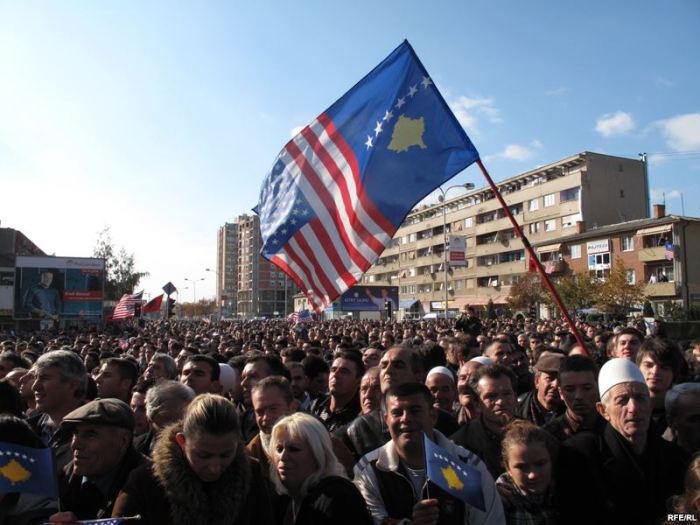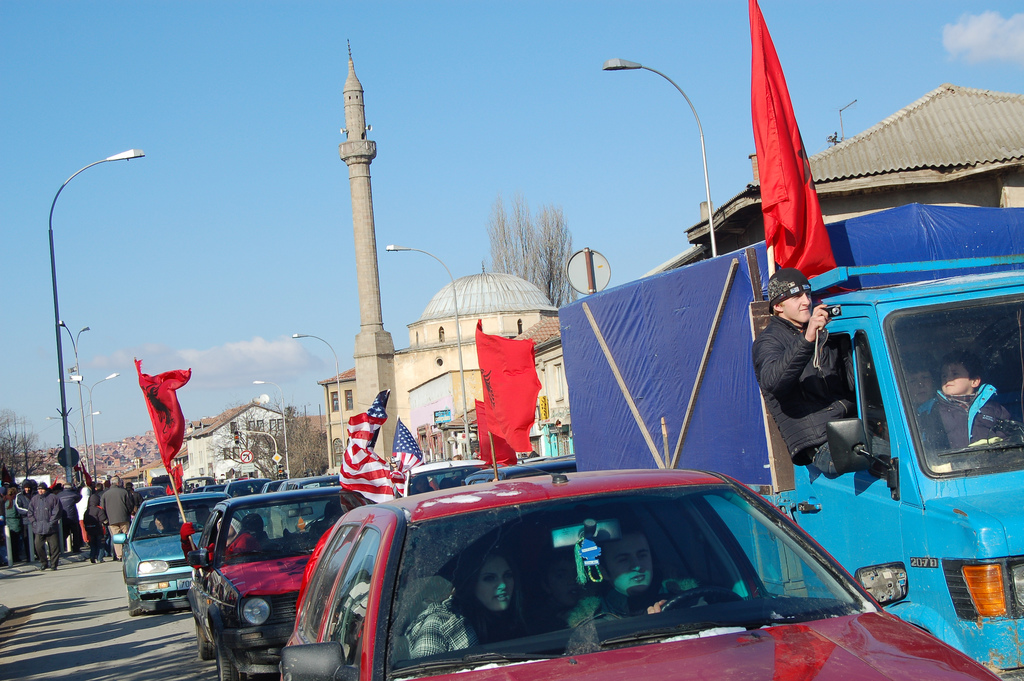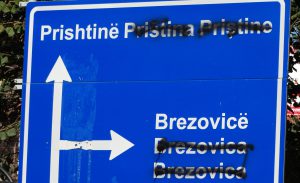
Views: 2764
Terrorists attacked the Macedonian city of Kumanovo on 9 May, but one wouldn’t know that by reading the Western media’s reaction to the tragedy, despite the fact that they typically mention that 8 police officers were killed and another 37 wounded during the firefight. The media’s disingenuous ‘reporting’ reeks of ulterior motives, which is evidenced most visibly by their reluctance to use the word terrorist without putting it in questionable quotation marks, but also takes more subtle forms such as casting suspicion on the government for complicity in the attac k and/or inferring that the attack was some type of legitimate protest reaction.
k and/or inferring that the attack was some type of legitimate protest reaction.
Western institutions like the EU and NATO are actually worse since they confer equal responsibility for the violence on both the terrorists (which they don’t even refer to as) and the Macedonian security services, and even the UN has taken to echoing their sly sentiments with all three entities questioning the official course of events and demanding a “transparent investigation”. The US and its main Western European NATO allies escalate the rhetoric and actually engage in a form of victim shaming against the country during its official two-day period of mourning by questioning its commitment to “democracy” and not showing any solidarity with it whatsoever in its fight against terrorism. This shameless act (and lack thereof) shows that they and all the previously mentioned actors are in fact implicit supporters of Albanian terrorism against Macedonia and strong proponents of the state destabilization.
Part I of the research demonstrates how unipolar information sources purposely manipulate their coverage of the latest terrorist attacks in Macedonia, while Part II begins by showing how this is also the case for the Western and pro-Western institutions of the EU, NATO, and the UN. The series continues by addressing how the US and its allies have tried to shame and intimidate Macedonia, and then concludes by identifying probable scenarios for how they plan on punishing the proud country for resisting their aggression.
Media Manipulation
Western media has become the vanguard of a unified information offensive against Macedonia, presenting the latest terrorist attack against it as either a potentially justified reaction or as some type of hoax by the government itself. Let’s look at how media outlets in the unipolar world have centralized their narrative about the events:
Al Jazeera:
Qatar’s official soft power provocateur, always in line with Western grand strategy, had this to say about the situation:
“The Macedonian government said eight police and 14 members of an “armed group” were killed after police staged a raid in the northern town of Kumanovo, seeking gunmen from Kosovo it claimed were planning to attack civilian and state targets…Kotevski named five leaders of the group, all citizens of Kosovo, as founders of paramilitary cells…However some residents in Kumanovo were deeply sceptical of the official version of events. “Me, like other citizens, we are surprised and no one knows what and why this happened. I know during the war in 2001 we were informed and we have supported these groups that were fighting for the Albanian cause but now it is the contrary,” Kumanovo resident Xhelal Ademi told the Reuters news agency. “The people in this region were guarding their villages to not let anyone infiltrate from outside our villages,” Ademi said…Authorities described [the earlier Gosince] incident as “very serious” and said Macedonia was the “target of a terrorist attack”.”
They follow the ‘quotation mark system’ of putting certain phrases in quotes in order to signify no endorsement but present what they intimate may be a disputable claim on the part of the original source. Judging by Al Jazeera, the terrorists might not have even been an “armed group”, but were rather paramilitary cells, thereby bestowing some layer of legitimacy to their violent activities. Then the Qataris allege some kind of broad conspiracy by selectively quoting local residents in order to create the impression that the attacks might not have happened at all. Finally, they use the quotation mark system once more to question whether the test-run attack from late-April was terrorist-related or even a serious matter in the first place, thus making it seem like it was of no more importance than a local football match.
CBC:
The Canadian Broadcasting Company puts a novel spin on their reporting by trying to tie it in with “anti-police brutality” agitation ongoing on Skopje. This “protest” agitation is nothing more than a simple borrowing of aggressive American protest tactics perfected in Ferguson and Baltimore for the betterment of Color Revolution tactics abroad. Zoran Zaev’s “revelations” are manipulated NSA-provided recordings designed to capitalize off of the global fawning of Snowden-like leakers, with the public now assuming that any “leaker” is unquestionably legitimate and not part of a carefully crafted information operation like Zaev and his cohorts are. It’s telling how the Color Revolution against Macedonia began by exploiting the ‘Snowden Effect’ and is now exploiting America’s latest protest craze against police violence, ironically by attempting to behave just as violently as some of the protesters in Baltimore in order to provoke the same ‘police violence’ they were supposedly protesting.
In any case, here’s how the Canadians try to con their audience about the terrorist attacks in Macedonia:
“An armed group attacked special forces police Saturday in a town in northern Macedonia in a clash that killed five police officers and injured more than 30, officials said, amid a political crisis that has raised concern about the stability of the Balkan nation…[The Interior Minister] added that the “terrorist group,” which had entered Macedonia from an unspecified neighbouring country, planned to “use the current political situation to perform attacks on state institutions.”…
Saturday’s clashes come as Macedonia is grappling with its deepest political crisis since its independence from former Yugoslavia in 1991. The government and the opposition have accused each other of planning to destabilize the country to take or preserve power, and some analysts fear leaders on both sides are ready to provoke ethnic clashes as leverage…
On Friday, thousands of opposition supporters took part in nationwide protests against alleged police brutality in Macedonia. The protests started after opposition leader Zoran Zaev — citing illegally recorded conversations — accused the government of trying to cover up the 2011 police killing of a 22-year-old man…Zaev on Saturday appealed for calm, but had earlier called for a large anti-government protest on May 17.”
As with Al Jazeera, they prefer to call the terrorists an “armed group”, only using the phrase terrorist group in quotations when quoting the Interior Minister. The article then transitions towards casting suspicion on the government itself for provoking ethnic clashes, which is in reality the absolute last thing that the authorities need at the moment as they defend against a Color Revolution attempt. Finally, the Canadians end their information package by trying to justify the attack through their mentioning of the Color Revolution “anti-brutality protests” and Zaev’s forthcoming call for chaos on 17 May.
CNN:
America’s premier propaganda outlet lives up to its reputation by strongly hinting that the terrorists might have been Slavic Macedonians unhappy with a 2001 ceasefire agreement:
“At least 30 other officers were wounded in the clashes that erupted during a police raid early Saturday on a group of roughly 70 “terrorists” in the town of Kumanovo, Macedonia, the country’s internal affairs ministry said…Albanian insurgents battled against the central government in 2001. Ethnic Macedonians became angry over the ceasefire agreement that ended the fighting and held violent protests that resulted in the President at the time, Boris Trajkovski, was evacuated. The ministry did not say who the “terrorists” authorities raided on Saturday were, nor if they were ethnic Albanians.”
This high-level information diversion is meant to make Albanian Macedonians and the world think that rabid Slavic Macedonian nationalists might be to blame for the killings, which like their information counterparts in Canada and Qatar, they refuse to fully recognize as terrorism. The point here is to create panic and further divide Macedonian society along ethnic and religious lines, ergo the original intent of the terrorist attack in the first place.
Guardian:
The British information bulldogs don’t hold back any punches in jumping straight to the point by titling their lead story “Violence between Macedonia police and ‘terrorists’ increases scrutiny of PM”. Their motive is to implicate democratically elected and legitimate Macedonian Prime Minister Nikola Gruevski in the terrorist attacks themselves, obviously as a means of making the Color Revolutionary provocateurs look ‘innocent’ by comparison. Here’s what the Guardian managed to gargle out about Macedonia:
“Details about the raid remain hazy, but the conservative government of Nikola Gruevski faced immediate calls from Nato and the European Union for a “transparent investigation” of what went on. Gruevski’s credibility with the west has already been called into question by months of opposition allegations of illegal wire-tapping and widespread abuse of power, leaving his government on the ropes with an opposition mass rally planned for 17 May.
The Albanian residents of Pero Ilievski Street in ethnically mixed Kumanovo, as well as Gruevski’s political opponents, accused the government of trying to create a diversion and blunt the bid to unseat him. “The timing is too suspicious to not consider a connection,” said Florian Bieber, a Balkans expert at the University of Graz, Austria. “This does not mean that it was not a terrorist attack, but it suggests that the government might have had a hand. The only obvious beneficiary of the violence is the ruling party.””
The above-cited quotations speak for themselves and are clear in advocating an anti-government agenda. The British hope that their perverted version of events catches on and becomes the official media narrative, since if that’s the case, then sanctions against the country can then begin to be discussed by the unipolar bloc.
Reuters:
This global brand, misleadingly thought of as being ‘neutral’ and ‘non-biased’, engages in a dangerous game of ideas by scarcely recognizing that the terrorists were even an armed group. Here’s what they have to say about the situation:
“The Balkan country’s interior ministry said an unspecified number of gunmen were also killed, but that it had no information on civilian casualties during clashes that began before dawn and stretched into the evening. Police said that acting on information about an “armed group” they had launched an operation in an ethnic Albanian district of the northern town of Kumanovo 40 km (25 miles) north of the capital Skopje…Observers fear political leaders on either side may try to stoke ethnic tensions as leverage…
Opposition leader Zoran Zaev, who has been releasing damaging wire-taps he says were recorded by the government and leaked to him by a whistleblower, appeared to suggest Saturday’s operation was carried out to create a diversion. “I call on Nikola Gruevski to immediately … explain who wants to destabilize Macedonia, why and with what purpose,” he said in a statement. “This dark scenario will not work. The citizens see who has an interest in such a scenario.””
On top of that, they’ve also tried to tie Gruevski to the attack by following the British blueprint and Zaev’s false statements. Again, the objective here is to discredit the government and create further destabilization within the country, all with the intent of stimulating the Color Revolution forces and breaking the solidarity of those who have been resisting thus far, especially Albanian Macedonians
Institutional Intrigue
Western institutions and their controlled appendages such as the UN are at the forefront of issuing veiled threats against the Macedonian government, and a simple glance at their copy-and-paste statements indicates the seamless level of strategic collaboration between them. In order of expanding scope and global importance, they are:
The EU:
Commissioner for European Neighborhood Policy & Enlargement Negotiations Johannes Hahn had this to say about the chaos in Kumanovo:
“I am deeply concerned at the unfolding situation in the Kumanovo region and possible injuries and loss of life. I urge the authorities and all political and community leaders to cooperate, to restore calm and fully investigate the events in an objective and transparent manner within the Law. I urge all actors for utmost restraint. Any further escalation must be avoided, not the least in the interest of the overall stability in the country.” (emphasis added)
 Pay particular attention to the call for an “objective and transparent” investigation and for “all actors” and “political and community leaders” to demonstrate “utmost restraint” and “restore calm”. This is a theme that will subsequently be repeated by NATO and the UN, and the final sub-section will describe what these euphemisms are meant to represent.
Pay particular attention to the call for an “objective and transparent” investigation and for “all actors” and “political and community leaders” to demonstrate “utmost restraint” and “restore calm”. This is a theme that will subsequently be repeated by NATO and the UN, and the final sub-section will describe what these euphemisms are meant to represent.
NATO:
Now let’s take a look at what Secretary General Jens Stoltenberg thought about it:
“I am following the developments in Kumanovo with great concern. I express my sympathy to the families of those who were killed or injured. It is important that all political and community leaders work together to restore calm and conduct a transparent investigation to establish what happened. I urge everyone to exercise restraint and avoid any further escalation, in the interest of the country and the whole region.” (emphasis added)
Again, the same types of phrases are popping up, almost as if this statement was written by the exact same speech writer as the one who penned the EU’s response.
The UN:
Finally, check out Ban Ki-Moon’s commentary (as expressed through a spokesperson) on Kumanovo and see if any similarities can be found:
“The Secretary-General is alarmed by the recent violence in the city of Kumanovo in the former Yugoslav Republic of Macedonia and extends his condolences to the families of those killed and injured. He strongly supports the calls by the European Union and other members of the international community urging the state authorities and all political and community leaders to cooperate to restore calm and to fully investigate the events in an objective and transparent manner.
At this sensitive time, the Secretary-General calls on all actors to exercise maximum restraint and to refrain from any rhetoric and/or actions that may escalate tensions further. He also encourages the country’s authorities to address the concerns voiced by the Office of the High Commissioner for Human Rights on 17 March 2015 and to reaffirm their commitment to fundamental human rights and the rule of law by fostering an environment in which opposing views can be expressed freely.” (emphasis added)
Aside from mirroring the previously highlighted statements, the UN leader jumps into the foray of domestic politics and Color Revolutionary rhetoric by trying to apply pressure against the Macedonian authorities. This shouldn’t be surprising in the least, as the UN has largely mutated into a supranational appendage of Western influence, so it’s unfortunately natural that this nominally neutral organization would become partisan to the West’s geopolitical games. Furthermore, it’ll be witnessed later on how Ban Ki-Moon’s domestic tinkering attempt in Macedonia perfectly complements the US Ambassador and friends’ victim shaming and intimidation from the day before.
Birds Of A Feather:
As the saying goes, ‘birds of a feather flock together’, and this quip rings true when it comes to Western institutions and their de-facto subordinates. The joint message being conveyed is that the Macedonian authorities themselves are complicit in the destabilization, hence why “all actors” must “exercise maximum restraint” and why a follow-up “objective and transparent” investigation is necessary. Going even further, this implies that the state’s resistance in combating terrorism helped contribute to it, implying that the country should have just rolled over and allowed the terrorists to take control of the city, or even worse, the entire country for that matter.
The invocation of “community leaders” is designed to create the sense that this was some kind of grassroots, local uprising, which it wasn’t at all, and is meant to drive a wedge between the government and local municipalities with significant Albanian populations like Kumanovo. From the look of it, it appears as though the West and its puppet UN appendage don’t support anti-terrorist operations unless they’re the ones conducting them and they’re being initiated for pro-Western geopolitical purposes. After all, this rhetoric against the Macedonian government is eerily reminiscent of the same type of statements being made against the Syrian one, which is also the regional anti-terrorism leader for its home area.
Attacking The Victim
Shaming:
The Ambassadors of the US, EU, France, UK, and Italy met with [Macedoniam PM Nikola] Gruevski two days after the attack as part of a prearranged meeting, during which they released a joint statement (read by US Ambassador Jess Baily, as it was) that can only be described as geopolitical victim shaming. As referenced by Reuters:
“In a statement read out by U.S. ambassador Jess Baily, the envoys criticised Skopje’s failure to address the “many allegations of government wrongdoing arising from the disclosures” published by opposition leader Zoran Zaev. “This continued inaction casts serious doubt on the government of Macedonia’s commitment to the democratic principles and values of the Euro-Atlantic community,” they said, adding that a lack of concrete action “will undermine Macedonia’s progress toward EU and NATO membership.””
What basically happened was that instead of showing solidarity with a European country in its fight against Mideast-trained (read: ISIL) terrorists that had just killed 8 police officers and injured a whopping 37 more, NATO (which is essentially what that group of governments collectively represent) took the opportunity to lambast the Prime Minister for not partaking in ‘regime tweaking’ and making it easier for the Color Revolution to succeed. One wouldn’t be mistaken for thinking that NATO is actually pleased that the terrorist attack was as violent and impactful as it was, since they and their affiliated media have been alluding that this is some type of punishment for the government’s ‘anti-democratic’ behavior as per the false Zaev allegations. It’s also significant that the US chose this joint occasion to make its first official remarks on the situation (there were no official State Department press releases about it) in conjunction with its NATO allies, and this needs to be elaborated upon further.
Intimidating:
The symbolism of the joint statement is that it’s a semi-official declaration of regime change intent by the US and its allies, who in essence served Gruevski with an ultimatum: he must either capitulate to a form of ‘organized’ regime change (‘regime tweaking’ and procedural moves to allow Zaev to slowly seize power) or face the wrath of a combined EuroMaidan Color Revolution 2.0 and a Greater Albanian-focused Unconventional War in forcing destructive regime change on the country. Gruevski and the Macedonians demonstrated that they will fight back and resist this aggression, which as was stated earlier, makes them the Syria of the Balkans in leading their regional anti-terror war. Hopefully, all comparisons can end there, although given the US template of chaos perfected in the Mideast, it’s likely that the struggle might become prolonged and internationalized, especially because of NATO-member Albania and NATO-protectorate “Kosovo’s” direct ideological and physical involvement.
Punishing:
Macedonia’s resistance to the unipolar Color Revolution and Unconventional War being unleashed against it is thus going to come with severe consequences. Judging by the NATO members’ joint statement on Macedonia annunciated by the bloc’s de-facto leader, the US, Macedonia isn’t ‘democratic’ enough for their liking and doesn’t embody the same Euro-Atlantic ‘values’, meaning that it’s slated to undergo the Syrian and Ukrainian ‘treatment’ to remedy these ‘ailments’. It was just explained how the country is defending against joint Color Revolution and Unconventional War offensives, but these indirect methods are expected to eventually evolve into a direct NATO war on Macedonia.
One such scenario could see a repeat of the 1999 NATO bombing of Serbia, but given Macedonia’s relatively smaller size and the denser concentration of Albanians along the country’s border with Greater Albania (Albania and “Kosovo”), a more militarily ‘efficient’ model will likely be deployed. This envisions conventional Albanian troops, under cover of NATO airstrikes (likely after the imposition of a ‘no-fly’ zone [always preceded by the destruction of the target country’s air force]), entering Macedonia and occupying the majority-Albanian-populated areas under the false pretexts of ‘humanitarian intervention’, ‘responsibility to protect’, and/or hypocritical anti-terrorism operations. A complement to this scenario could see irredentist Bulgarian troops in the east assist them by exploiting the chaos to indefinitely occupy territory that their nationalist politicians claim is historically their own as NATO’s reward for their earlier rejection of South Stream. Finally, a variation of both of these could see an Albanian and/or Bulgarian (joint) intervention supported by other NATO members that would fully occupy the country, change the government, alter the country’s constitutional name, and then partition the state between the Albanian and Slavic Macedonians.
Concluding Thoughts
 The West has unequivocally launched a dangerous information war against the Republic of Macedonia, once which carries with it the threat of increasing violence and possible military occupation. While the conventional information consumer may not be aware of the importance of syntax and inference in reporting on geopolitical events, the fact remains that it’s an extremely pivotal factor in shaping the context and overall framework related to an event. From the snide inferences that the government brought last weekend’s horrible act of terror upon itself to shameless attempts at downplaying the atrocious militancy of the terrorists, each of these information offensives carry with them associated consequences in setting up the aggressors’ next move. By combating their falsehoods and proving the erroneousness of their assertions and intimations, individuals can learn the truth behind the terrorist attacks that the mass media is obscuring. The War on Macedonia isn’t a ‘civil war’ or ‘grassroots anti-government uprising’, but is contrarily part of a larger Western-supported proxy war against Russia and its Balkan Stream pipeline, one which has unfortunately taken the small geostrategic country of over two million people hostage and made it the West’s latest geopolitical target for execution.
The West has unequivocally launched a dangerous information war against the Republic of Macedonia, once which carries with it the threat of increasing violence and possible military occupation. While the conventional information consumer may not be aware of the importance of syntax and inference in reporting on geopolitical events, the fact remains that it’s an extremely pivotal factor in shaping the context and overall framework related to an event. From the snide inferences that the government brought last weekend’s horrible act of terror upon itself to shameless attempts at downplaying the atrocious militancy of the terrorists, each of these information offensives carry with them associated consequences in setting up the aggressors’ next move. By combating their falsehoods and proving the erroneousness of their assertions and intimations, individuals can learn the truth behind the terrorist attacks that the mass media is obscuring. The War on Macedonia isn’t a ‘civil war’ or ‘grassroots anti-government uprising’, but is contrarily part of a larger Western-supported proxy war against Russia and its Balkan Stream pipeline, one which has unfortunately taken the small geostrategic country of over two million people hostage and made it the West’s latest geopolitical target for execution.
Originally published in May 2015
About the author: Andrew Korybko is the political analyst and journalist for Sputnik who currently lives and studies in Moscow, exclusively for Oriental Review.
Source: Oriental Review
Origins of images: Facebook, Twitter, Wikimedia, Wikipedia, Flickr, Google, Imageinjection, Public Domain & Pinterest.
Read our Disclaimer/Legal Statement!
Donate to Support Us
We would like to ask you to consider a small donation to help our team keep working. We accept no advertising and rely only on you, our readers, to keep us digging the truth on history, global politics, and international relations.










